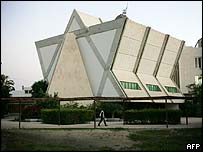The BBC has been covering Israel’s decision to leave behind a number of synagogues in Gaza. This has been in the offing since a couple of weeks ago – YNet News reported at the end of August:
Chief Rabbis Shlomo Amar and Yona Metzger were invited to attend Sunday’s government session called to discuss the razing of synagogues in the Gaza Strip and northern West Bank.
The rabbis have raised a last-minute demand, calling on the government to refrain from demolishing the synagogues and ask the Palestinian Authority to safeguard them under international monitoring.
…The decision to invite the chief rabbis to attend Sunday’s government session followed an opinion offered by Rabbi Amar, and also backed by leading rabbis Yosef Shalom Elyashiv and Ovadia Yosef, which called to leave the Gaza synagogues intact. Razing the synagogues would serve as a precedent for demolishing synagogues in abandoned Jewish communities overseas, the rabbis said.
We’re also told that Chief Ashkenazi Rabbi Yona Metzger had favoured demolition, as the buildings were no longer sacred, but had changed his mind following “scathing criticism”. WorldNetDaily also noted religious objections:
Rabbi Shear-Yashuv Cohen, former chief rabbi of Haifa and a member of the chief rabbinate, told WND, “According to Jewish law, synagogues cannot be destroyed unless new ones are already built, and even then, the issues are complicated. Here, the former Gush Katif residents don’t have homes yet to live in, new synagogues have not been built, so there isn’t even a question.”
Cohen is referring to Baba Bathra 3b in the Talmud, which states that
Some honor is to be paid even to the ruins of a synagogue or house of study. It is not proper to demolish a synagogue and then to build a new one either on the same spot or elsewhere; but the new one should be built first (B. B. 3b), unless the walls of the old one show signs of falling.
But does this apply to a synagogue in an area that has been abandoned? It looks to be like a practical instruction concerning how a synagogue should function in a community – obviously if you demolish before building a new one, there will be no place to worship or keep the holy objects in the interim. But I’m no Talmudic scholar…
Meanwhile, some Israeli politicians have taken this position even further:
Foreign Minister Silvan Shalom explained his decision to vote against demolishing the structures…”Jews do not destroy synagogues,” said Shalom.
Mark Elf at Jews Sans Frontieres finds that argument rather odd:
This is very strange because, not that long ago, Stanley Kalms wrote a report on the United Hebrew Congregations of the British Commonwealth and how it should function in future. He argued for the disposal of various shuls (synagogues) on the grounds that it was uneconomic to keep them. I remember one in Earlham Grove in London E7. My nan used to go there. Even I went there sometimes. Well it’s not there now.
Shalom added:
“I hope the Palestinian Authority will come to their senses and not allow barbarism and vandalism to rule over the synagogues. If this does happen, the world will see what we’re dealing with.”
Or in other words, as Haaretz puts it in a critical article:
If the synagogues are doomed to be destroyed, let the Palestinians do it rather than the Israelis, to make them look bad in the eyes of the world.
The fear (or hope?) is that there will be a repeat of the unattractive scenes that followed Israeli withdrawal from Nablus in 2000, when Joseph’s Tomb was attacked and Jewish objects destroyed. (WND absurdly called this “one of the most extreme holy site desecrations in history”, putting both Antiochus IV and the Fourth Crusade into a rather odd perspective.)
The same article goes on to note that:
Out of some 140 village mosques that were abandoned due to the war in 1948, some 100 were totally torn down. The rest, about 40, are in advanced stages of collapse and neglect, or are used by the Jewish residents for other purposes.
…Several mosques serve as housing, and others are used for commercial and cultural purposes. The mosque of an abandoned village on the Iron Valley serves a kibbutz carpentry. A mosque in an artists’ community in the Carmel serves partly as a restaurant and bar. Other mosques serve as museums and galleries. The large synagogue in a township near Rehovot is located inside the abandoned village’s mosque, whose minaret was destroyed and the symbolic half crescent atop its dome has been replaced by a menorah.
One suggestion made by a Palestinian spokesman I just heard on the World Service was having the synagogues shipped out to the USA. Another possibility has also been raised. Back to YNet News:
“There’s obviously a danger that should the synagogues remain they will be desecrated, and may even be turned into mosques,” sources in Jerusalem said.
Turned into mosques? Let’s see now…

Filed under: Uncategorized



Leave a Reply